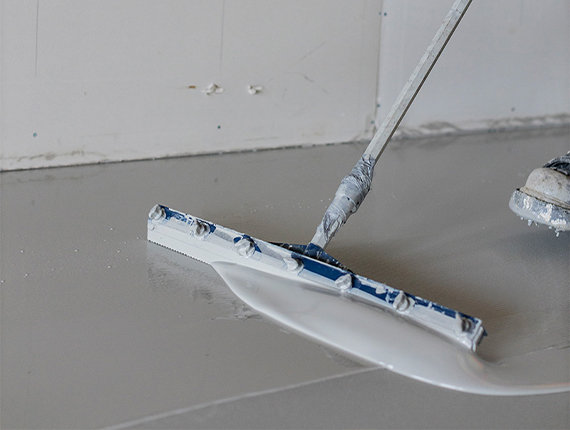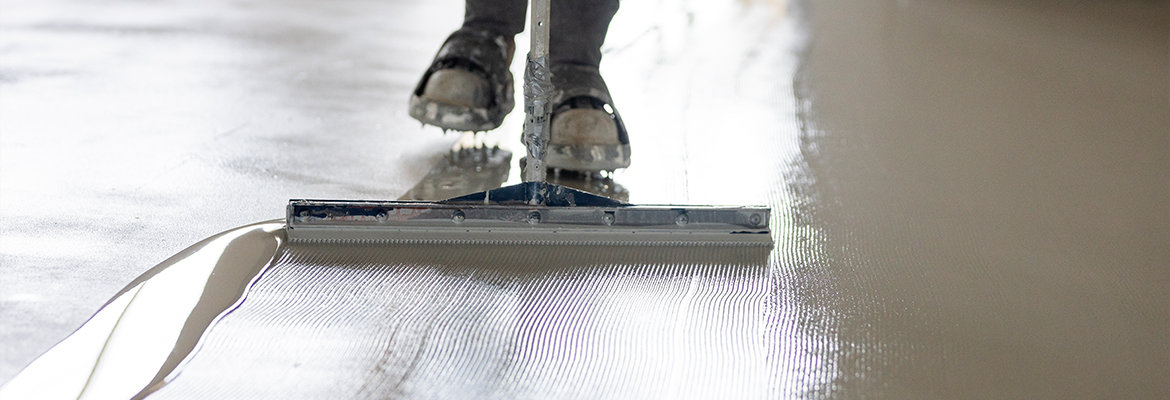Every aspect requires careful consideration when building a food processing plant or commercial kitchen. Flooring that can handle the daily stresses created in a food processing environment is just as important as proper ventilation, efficient appliances, and employee safety.
Polyurethane (PU) floor coatings are also known as PU Screed, Cementitious Polyurethane systems, Cementitious Urethane, Polyurethane concrete, and they can be applied in a slurry broadcast system or a trowel system with a topcoat.
There are several agencies which oversee food processing plants in Canada and the US:
USDA (United States Department of Agriculture)
FDA (Food and Drug Administration)
HACCP (Hazard Analysis Critical Control Point)
NSF International/ANSI 18 (National Sanitation Foundation)
CFIA (Canadian Food Inspection Agency)
Health Canada
FSEP (Food Safety Enhancement Program)
These agencies have requirements that all food processing flooring must meet:
Floors must use non-porous materials that have no cracks, seams, or gaps in the surface along with anti-microbial properties.
Floors must be both chemical resistant and waterproof to prevent damage to the surfaces during operations.
Flooring should be easy to clean, maintain, and sanitize.

Polyurethane floor systems exceed or meet all criteria for a food processing floor and although they have a higher upfront cost, they last longer and require less maintenance during their lifespan. Additives in the polyurethane flooring help make it resistant to thermal shock. Thermal shock cycling can decrease flooring lifespan.
Food production and processing flooring needs to inhibit the growth of mould spores and bacteria, including gram-positive and gram-negative bacteria such as: E-coli, MRSA, C. difficile, and Salmonella typhi. Additives can boost the effectiveness of PU flooring, not only will it be seamless, but the floor can also actively kill bacteria. Some additives can remain active for the entire lifetime of the floor, even if worn or damaged, making them highly effective for long-term hygiene performance.
Food processing facilities face special requirements such as physical impacts, heavy vehicle traffic from laden forklifts, or point loading. Food processing floors are exposed to a large amount of natural organic acids from food making polyurethane a great choice with its resistance to acid corrosion and alkalis.
There is no flooring solution that fits all projects, so it is important that you speak with one of our experts at BNE to make sure your flooring solution is the correct one for your specific usage.
CONTACT A BNE EXPERT
In general, polyurethane floors are well suited for the following industrial and commercial applications:
Commercial Kitchens
Manufacturing Production
Facilities
Institutional Kitchens
High-end Restaurant
Kitchens
Breweries, Wineries, and Distilleries
Kegging, Bottling, and Canning Facilities
Pet food processing plants
Food packaging plants
Bakeries
Walk-in Freezer and Refrigerators
Loading Docks
Battery
Charging/Maintenance Shops
Cafeterias
Fryer Lines
Locker Rooms
Wash Bays
Polyurethane offers the following benefits:
Abrasion resistance
Chemical resistance
Acid resistance
High-impact resistance
Stain resistance
Low-Odour and Off gassing
Slip Resistance
Vibration resistance
Seamless flooring
Thermal shock resistance
Self-levelling
Anti-microbial
Wear resistance
Waterproof
Smooth or textured finish
Fast installation and quick cure time
Easy to clean
Low maintenance (No polishing or waxing)
BNE offers the following services for your food processing facility or restaurant:
Slab installation/Concrete floor finishing
Grinding and surface preparation
Concrete repair and crack filling
Slab stabilization, joint repair
Traffic membranes
Polyurethane floor coating
Floors in restaurants and food processing plants are exposed to high intensity heat from industrial appliances and hot water pressure washing or steam cleaning. The floor in a walk-in freezer or the floor in front of an oven running all day is exposed to extreme variations that can create thermal shock.
Concrete expands and contracts at a different degree than the coating on top, so cycling between hot and cold creates blistering or delamination where there coating eventually separates from the concrete subfloor.
Delamination will create cracks, flakes, and chips on the floor rendering the floor susceptible to damage from water, chemicals, etc. The more extreme the temperature fluctuations in the facility, the more you need a thermal shock resistance floor coating like polyurethane.
PU coatings have similar thermal expansion coefficient as the concrete substrate they are bonded to. That means that they heat and contract at the same rate as the concrete underneath them which eliminates delamination or blistering.
A floor coating used where food is produced, processed, packaged, or stored must be able to withstand:
Aggressive cleaning methods are used regularly in food processing and production facilities to deal with stubborn biological contaminants such as blood and grease. Epoxies or MMA Flooring Systems are not recommended in areas exposed to hot water washdowns and/or steam cleaning.
In wet environments, flooring must also provide an adequate amount of worker safety. You floor design must include a proper sloping and drainage system to prevent the pooling of water and to minimise the risk of spills. We can add aggregate to the PU flooring to increase traction, but it also increases spaces for bacteria to accumulate. Speak with your BNE representative to see what the best level of compromise between traction and easy-to-clean flooring is for your specific project.
Standing liquid can damage any type of flooring by reducing adhesion and breaking down the resin over time. Proper drainage is key to making sure your floors are not exposed to standing liquids. However, not all drainage systems work with all types of flooring, so it is important to speak with your BNE sales representative to make sure you have the correct flooring for your project.
Epoxy floors can tolerate up to 65 degrees Celsius whereas properly installed PU flooring can handle up to 120 degrees Celsius.
Proper installation of your polyurethane floor is very important. If the coating is applied too thin it can start to form cracks which are very hard to keep clean and bacteria free.
A properly installed polyurethane (PU) floor coating will last more than three times as long as an equivalent epoxy floor; 15+ years vs. 5 years for epoxy.
Polyurethane floors are generally softer and more elastic making them more resistance to scratching than epoxy. And they have a relatively quick curing time, being usable in 6-8 hours. This keeps down-time to a minimum, saving you money and getting you back to production as quickly as possible.
PU floors are ideally suited to the dairy industry as they can resist the natural acids milk and cheese production and prevent the floors from corroding and yellowing. In the food and beverage industry these floors provide superior performance from chemical attacks such as:
Organic/natural food acids
Sugar
Hot oils
Fats
Malt
Caustic agents
and powerful cleaning products
What are polyurethane (PU) floor coatings?
Polyurethane floor coatings, also known as PU Screed or Cementitious Urethane, are durable, seamless flooring solutions ideal for food processing plants and commercial kitchens. They offer resistance to chemicals, thermal shock, and bacteria growth.
Why is polyurethane flooring ideal for food processing environments?
PU floors meet food safety standards, providing a non-porous, waterproof, and antimicrobial surface that is easy to clean and maintain, making it perfect for high-traffic, high-risk environments.
What certifications or standards must food processing floors meet?
Floors in food processing plants must meet guidelines set by agencies such as the USDA, FDA, HACCP, NSF International, CFIA, and Health Canada, ensuring they are safe, hygienic, and durable.
How long does polyurethane flooring last?
Polyurethane floors typically last over 15 years, which is more than three times longer than epoxy floors. Their longevity, along with low maintenance, makes them a cost-effective choice over time.
What industries benefit from polyurethane flooring?
Polyurethane coatings are ideal for a range of industries, including commercial kitchens, food processing, breweries, bakeries, manufacturing facilities, and institutional kitchens.
How does polyurethane flooring resist bacteria and mold?
Special additives in PU coatings inhibit the growth of harmful bacteria and mold, ensuring long-term hygiene and safety, even in areas exposed to high moisture or organic acids.
Can polyurethane floors withstand heavy machinery and forklift traffic?
Yes, polyurethane flooring is designed to handle physical impacts, heavy traffic, and point loading, making it ideal for environments with heavy machinery or forklift use.
Is polyurethane flooring resistant to chemicals and acids?
PU floors are resistant to a wide range of chemicals, including natural food acids, oils, fats, and powerful cleaning agents, protecting the surface from corrosion and damage.
What makes polyurethane floors easy to maintain?
Polyurethane floors are low-maintenance, requiring no waxing or polishing. They are easy to clean, maintain, and sanitize, helping facilities stay compliant with food safety standards.
How quickly can polyurethane floors be installed?
Polyurethane floors have a quick cure time, allowing the floor to be usable within 6-8 hours of installation, minimizing downtime and getting your facility back in operation quickly.
Do polyurethane floors need a special installation process?
Proper installation is crucial for the longevity of PU floors. A professional application ensures the coating is applied at the correct thickness to avoid cracks and maintain hygiene.
Can BNE help with polyurethane flooring installation?
Yes, BNE offers full services, including slab installation, concrete preparation, crack filling, and polyurethane coating application tailored to your specific needs.